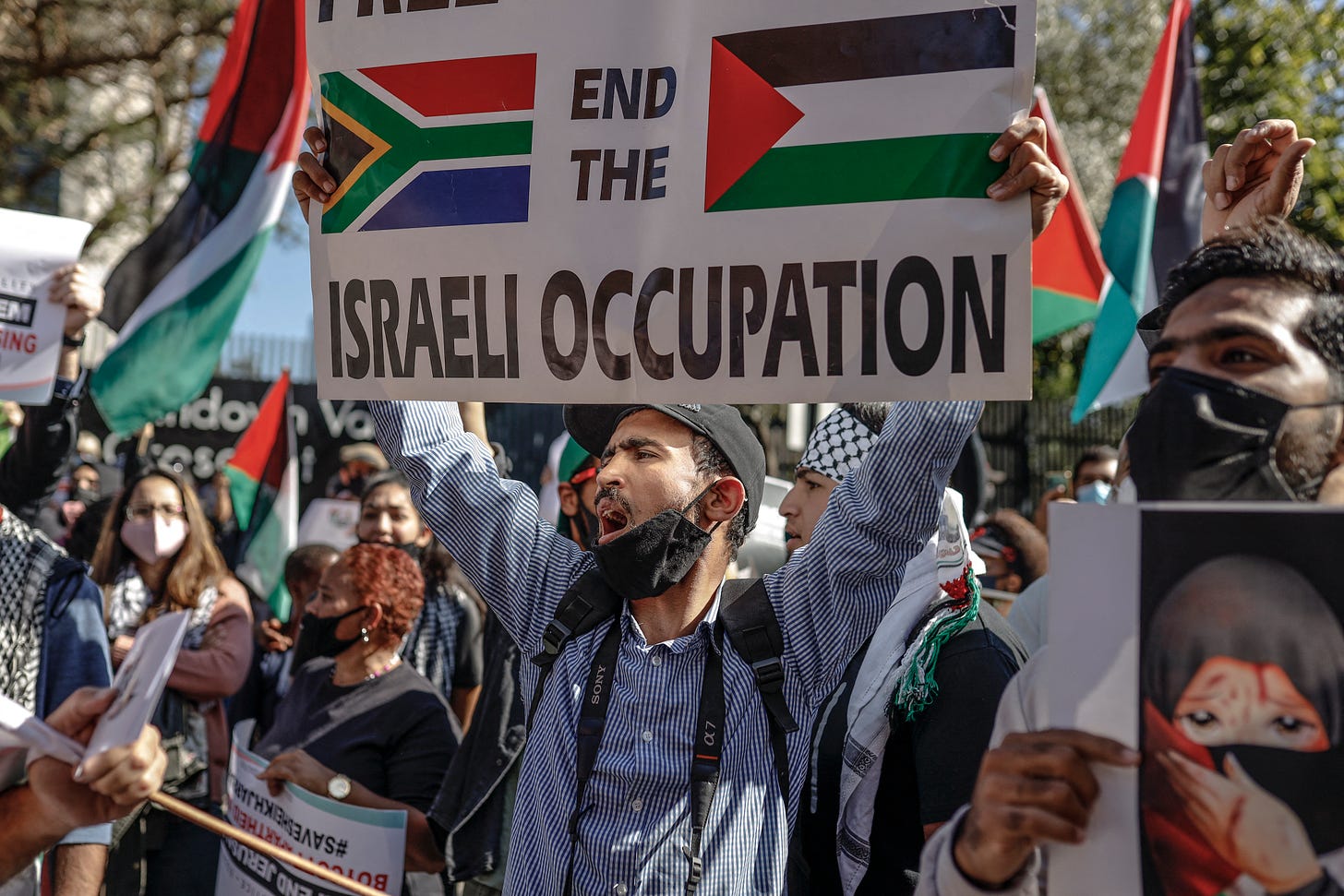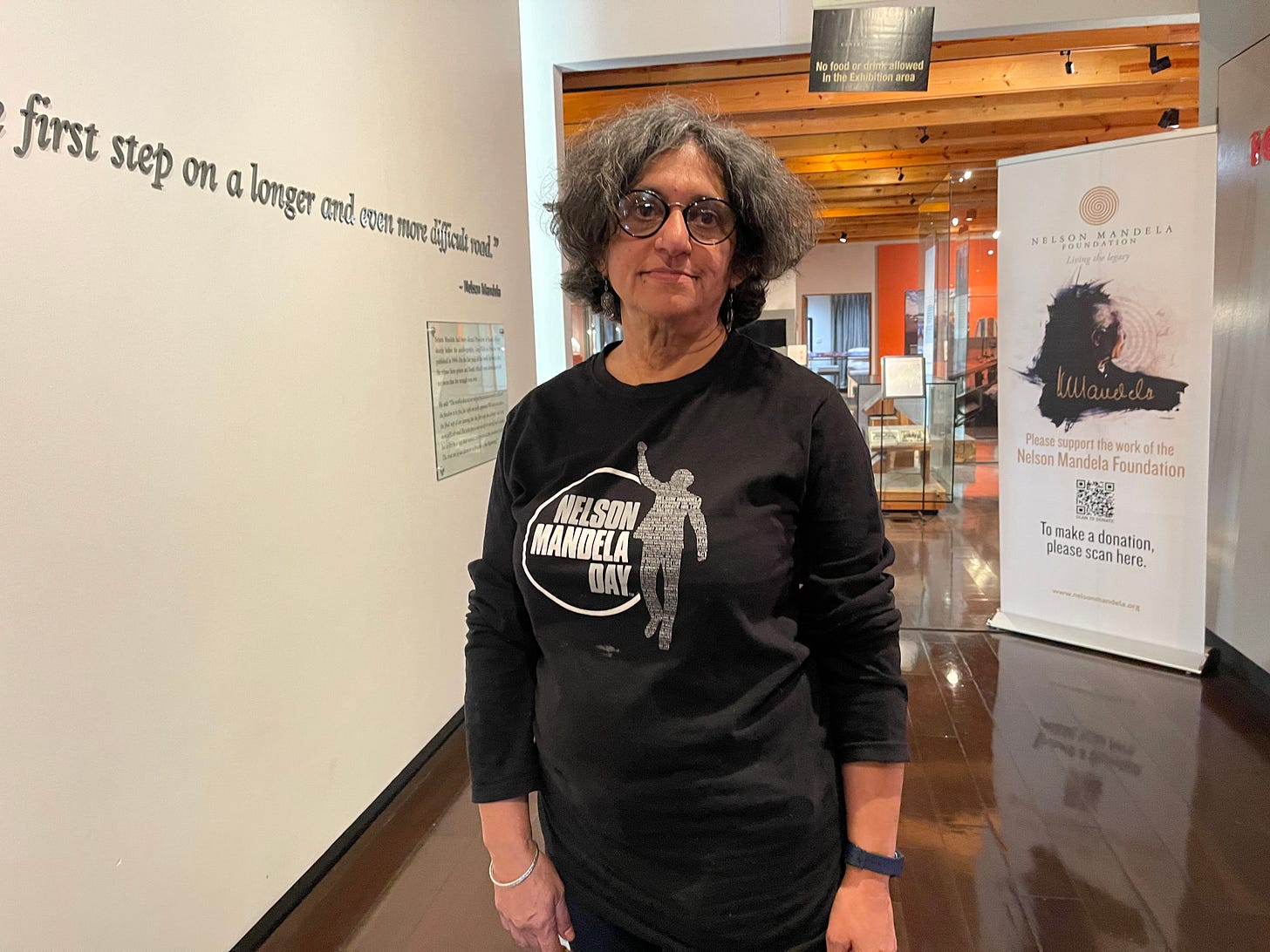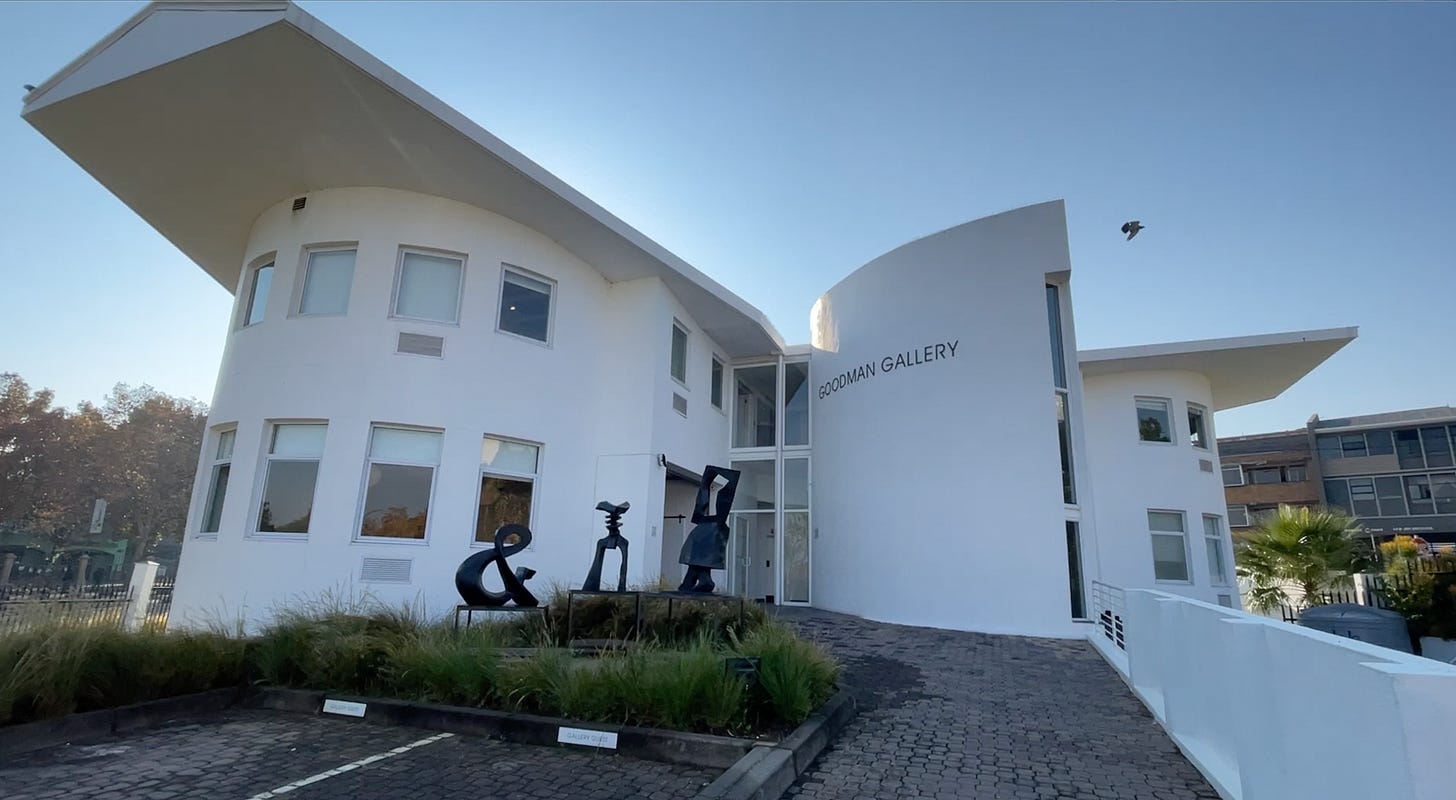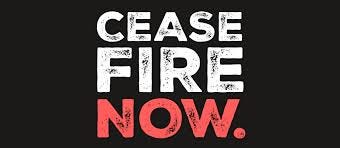On South Africa, Palestine, and solidarity
...despite the limitations of geography, or the limited power of journalistic writing
Dear readers and subscribers,
In the past 15 years, I have been reporting from places like Haiti, Nairobi, Dakar, Kampala, Mogadishu, Tunis, Algiers, Erbil, Bangui, Istanbul, Calais, Ventimiglia, Essaouira, Palermo, London, Bristol, Paris… and most recently Johannesburg again.
Being back in South Africa, at this time of our world history, felt particularly important to me, because it’s a fascinating country, and because of my admiration for the country’s fight for freedom and democracy.
Thinking that the end of apartheid was only 30 years ago all the more…
And because SA is one of the leaders of the fight against apartheid and segregation anywhere in the world, it has offered special support to Palestinians.
2024 is the 30th anniversary year of the end of apartheid as SA knew it, and of the election of its first black president, Nelson Mandela, in May 1994.
It is also the sad commemorations of the 30 years that separate us from the worst recent genocide, in Rwanda, against 800 000 Tutsis, but also responsible for the death of many anti-genocidal Hutus and so many Congolese.
As Europeans remember D-Day this week, we sadly have to live with yet another war in Europe. My generation, where kids like me learned German from the age of 10 to ensure reconciliation between our countries, is now walking all over these principles to save and assure peace.
As a child, I thus learned about the horrors of the two great wars many years before I was able to even learn about the horrors perpetrated against my own people, in northeastern Algeria…
I cried so many times for so many years watching so many movies about the fate of Jewish people in Europe, from 9 or 12 years old, while my school was still refusing to teach that colonisation even happened (the classes about the colonies started with the 1960s and the decolonial movements, how ironic…). And my parents were too busy trying to spare me for as long as possible the details of their own lives, their parents’ lives, their ancestors’ lives…
Yet, in my lifetime, the horrors of Bosnia made us say ‘never again’... again.
In parallel, the “Western World” launched one then two wars on Iraq, then on half of the Middle East.
Only a few months ago, a writer I used to call a mate wrote on a public network that ‘colonial violence’ was less important than a ‘real genocide’, in the case of Namibia versus Armenia. Because she had just penned an essay claiming that the genocide perpetrated by the Ottoman empire against the Armenians was the first of the 20th century. While the first genocide of the 20th century was the one perpetrated by the Germans in Namibia.
Why did she write that? Because her essay was meant to convince the USA that the tragedy of Armenians still matters… And it does. But does it require the erasure of other tragedies to do so?
I naively thought she had made a mistake, or was ill-informed, so I corrected her, but she insisted that violence on a ‘colonised people’ was less of a crime.
The fact that an American campaigner can feel free to downgrade ethnic cleansing and genocidal violence because they happened to non-white people, in what is now known as the Global South, the fact that she can publicly do so in 2024 without feeling any remorse, tells a lot about the state of our world and its so-called ‘international community’.
This is why, for readers in the Global North, or more specifically in the western world, aka the USA, Europe and Australia, the cases raised recently by the South African government, South African activists and organisations such as the Nelson Mandela Foundation in Johannesburg for Palestinians are so important.
After eight months of massacres in Gaza, the case of Palestine stands out in the South, but still not in most European countries.
SA's support to Palestine and Gaza in particular is heat-warming for many… When western governments side with the arm dealers.
ICJ hears South Africa's calls to stop Israel Rafah offensive
South Africa will ask the International Court of Justice (ICJ) on Thursday to order an immediate halt to Israel's incursion in Rafah, describing it as a "genocidal" operation threatening the "very survival of Palestinians".
Issued on: 16/05/2024
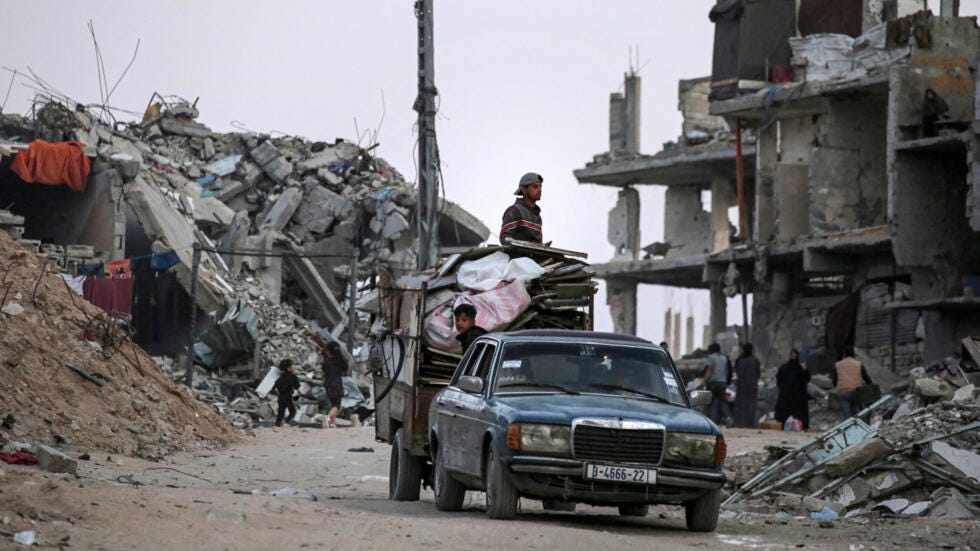
By: RFI
Top lawyers for Pretoria will kick off two days of hearings at the Peace Palace, home of the ICJ, imploring judges to order a ceasefire throughout Gaza.
In Johannesburg, I met with university lecturers and professors, campaigners, workers, potential voters… Most of them had a word for Palestinians.
Yet, this could change if the Democratic Alliance (DA), credited with around 25 percent of the voting shares, came to form a coalition government with the African National Party, in power since 1994.
Because the DA doesn’t support the BRICS’s foreign policy, and tends to stand with Israel. The majority of its voters are indeed the rich white South Africans, who used to be in favour of apartheid.
If you’re interested in South Africa’s political future, here is my latest podcast episode about it:
Spotlight on Africa
South Africa's ANC on the brink of losing majority, coalition government looms
On 29 May, South Africans participated in parliamentary and provincial elections in the most fiercely contested vote since the end of apartheid in 1994.
After 30 years in power, the African National Congress, once led by Nelson Mandela, could lose its majority.
With Tchepo Moloi, a lecturer at the University of Johannesburg, Gareth Stevens, vice-chancellor of the University of Witwatersrand in Johannesburg, and William Gumede, political analyst, also at the University of Witwatersrand, we examine how the past 30 years have led to this pivotal moment and how a coalition government could transform South Africa's political landscape.
We will also hear from curator Aude Leveau Mac Elhone, who has organised the exhibition Brazil and Africa, a Shared History in Gorée, Dakar, Senegal, along with the artist Aline Motta.
And my latest article:
SOUTH AFRICAN ELECTIONS
Zuma's boycott of election results forces ANC to consider coalition with Malema
As South African President Cyril Ramaphosa urges unity and open dialogue about the upcoming coalition, former President Jacob Zuma boycotted the results ceremony. Despite finishing third, Zuma's uMkhonto weSizwe (MK) party has refused to acknowledge the results. However, the party may still hold significant influence over the country's future.
Issued on: 03/06/2024 - 15:09
Reporting in Johannesburg, I was particularly interested in the cultural activism that led to the end of apartheid and the persistence of such activism against racism today, in South Africa, and for the Global South.
At the Nelson Mandela Foundation, the head of archives, Razia Saleh, reminded me that Mandela had trained with the FLN in Algeria, and had never stopped supporting the call for freedom from Palestinians.
To report on this cultural activism is why I spent two days with curators and an artist at the Goodman Gallery, which, for almost six decades has supported black artists despite apartheid and against apartheid, including with one of their key curators and now archivist, Neil Dundas.
He has an incredible memory of these events, art shows and creativity, and access to archives about all the artists that were involved in the resistance, including the likes of William Kentridge.
Thanks to the gallery’s staff, I had a meeting with one of their most acclaimed South African black painters, Sam Nhlengethwa, at his house, to discuss how black painters survived working under apartheid.
That’s why I wanted to meet the legendary jazz musician Sipho Mabuse, in Soweto, who performed with Miriam Makeba among others. We discussed his five decades of career in Southern Africa and beyond, performing for progress and fighting discrimination, how he and his band had to leave SA to carry on producing music, and how music was a key part of the cultural resistance.
A role the historians I spoke to also highlighted.
My video edits of my interviews with the aforementioned artists will come out soon.
Before anyone start dealing with Middle Eastern or Palestinian politics, we must see an end to the war, the massacres, the war crimes…
Still, I’m writing here. And I post on my blog, and on social media: Twitter, BlueSky, Instagram, LinkedIn…
I sign more petitions, and I encourage protests…
I know and feel that this isn’t enough to stop the horrors and that massacres, however.
But what is? or should I say who?
As one man only seems to be able to stop his ally Netanyahu: the president of the not so United States of America. And, tragically, he doesn’t seem decided yet…
Thanks for reading…
Stay safe in this mad world, and if you celebrate the end of a war that came 80 years ago, I hope you’ll still have a thought for the ones happening these days in Palestine, Sudan, the Congo, Ukraine… Even if they take place a little further away.
Best,
melissa
-
Melissa Chemam
Journalist & Writer
@ RFI English, New Arab, ART UK, Byline Times...
My blog: https://melissa-on-the-road.blogspot.com/
My website: https://sites.google.com/view/melissachemam
TikTok channel: https://www.tiktok.com/@melissaontheroad
YouTube Channel: https://www.youtube.com/channel/UCXE4ofFjz0lsRzemjdmFf7w



